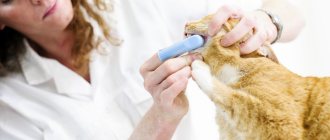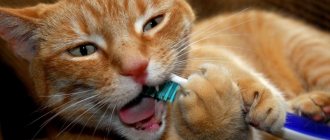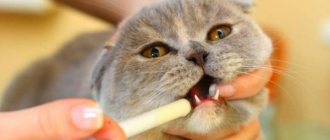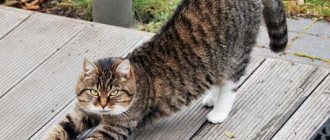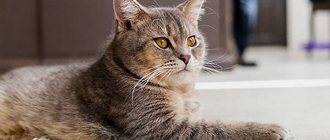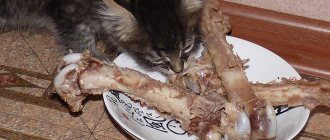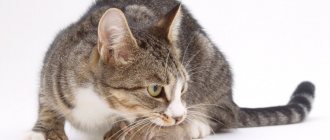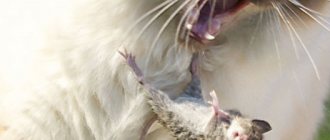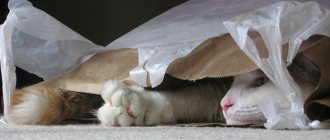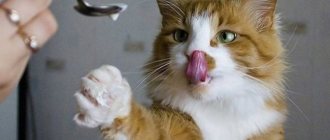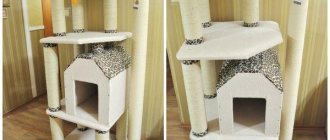The cat became the first animal that was tamed by man in primitive times. Her developed hunting instinct did not go unnoticed. Regularly caught rodents on the territory of the house and land. An animal has become a friend, a companion, a family member, and a weapon against mice and rats. The question of whether cats eat mice or just catch them is asked by many owners after unusual finds in the house. The hunter brings the caught prey to the owners, shows off the trophy, and leaves it in a visible place.
Why do cats eat mice?
Hunting and eating tailed rodents is not only satisfying the hunting instinct, but also maintaining the cat’s health, which he is trying to ensure for himself at a natural level. The fact is that the brain of mice contains a large amount of taurine, which is vital for cats. This substance plays a huge role for the animal:
- regulates the operation of the central system;
- forms strong immunity;
- normalizes the process of blood clotting, preventing the opening of internal bleeding and promoting rapid healing of wounds;
- maintains the functioning of the reproductive system at the proper level;
- is a strong antioxidant that cleanses the body;
- facilitates contraction of the heart muscle, replenishing the necessary calcium concentration.
If the level of taurine in the body drops as a result of insufficient intake from food, the animal may develop heart and vascular diseases, as well as neurological disorders. When a cat suddenly starts catching and eating mice, this is a signal for its owner that it is necessary to reconsider its diet and introduce foods enriched with taurine into the diet.
Other elements necessary for a cat - sulfonic acids, which include methionine, cystine and cysteine, are found in mouse skin. These sulfonic acids are necessary to maintain the normal condition and thickness of the cat's coat. If a cat eats a mouse along with its skin and fur, it means that it is experiencing a shortage of these elements.
Does a cat eat mice?
If a pet's diet is balanced, and it receives the substances necessary for the normal functioning of the body with food, then it is unlikely that it will eat rodents. A normal healthy cat will not refuse to catch mice, but hunting will turn into entertainment for him. Many fanciers are faced with a situation where a cat brings prey into the house, displays it in a visible place, bragging about its achievements to the owner. Another option is also possible: the animal hides, say, rats with their heads chewed off, in a secluded corner, under the carpet. An unpleasant smell, coming from nowhere, makes it possible to detect a “storeroom”, and this is a problem that needs to be solved.
Satisfying the hunting instinct
Even the cutest and fluffiest kitten once played the role of a hunter and predator in nature. After people domesticated cats and began using them as pets, they no longer needed to hunt for food. However, instinct periodically takes over and requires its manifestation in domesticated conditions.
Even if a cat’s body does not lack any elements to maintain health, hunting for mice is its natural need, a reflex that cannot be restrained. Catching mice is not just the job of barn cats. Many purebred kittens living in greenhouse conditions, once they see a mouse, will definitely chase it. But whether they eat their prey for lunch or not depends on whether they are tormented by hunger.
Instincts or fun
Yard kittens, forced to fight for existence, hunt mice like adults from the age of 5 months. In the USA, they conducted an experiment in which they established a connection between the living conditions of kittens and their hunting reflexes, first by mating purebred and street cats with one cat. The litters, after they were born, were swapped - the purebreds were given to the yard mothers and vice versa.
As a result, it turned out that initial hunting skills were inherent in both groups, since mothers regularly carried mice to their litters. The difference appeared at the next stage: the street cat killed rodents and gave them to kittens, while the purebred cat only played with the mouse.
Important! The researchers concluded that to consolidate the reflex of catching/eating living creatures, instinct alone is not enough, but skills acquired through education are necessary.
On the other hand, a kitten growing up isolated from its fellow cats independently learns the basic wisdom of a cat (washes itself, sharpens its claws, snorts, relieves itself, meows pitifully or angrily) and is quite capable of catching a mouse. Another question is whether he will eat it or not. If a kitten is very hungry, it is unlikely that the lack of a mother's example will stop him.
Unhealthy food
Cat owners, especially people living in private properties and houses, rejoice when their pets start hunting for mice - pests of the household, and do not find anything wrong with the fact that the hunter decided to feast on his trophy. On the one hand, eating mice is natural for cats, on the other hand, such a lunch or dinner can turn into a huge problem for the animal, and often for the owner himself.
Rodents, including mice, are carriers of dangerous diseases that can infect a pet and even transfer them to humans through close contact. After eating a mouse, a cat can become infected with the following infections:
- Rabies is a very serious disease that can be fatal if not treated promptly. The danger of this disease is that in the initial stages it does not manifest itself in any way, and at this moment the pet, even during play, can accidentally bite the owner, infecting him in the process. If a domestic cat often hunts mice, the likelihood that he will get rabies is extremely high, which means that such a pet poses a threat to all family members. You can protect animals and people from rabies infection by regularly vaccinating them.
- Trichinosis is caused by parasites - nematodes, which can live in the body of a mouse, and when a cat eats its meat, it can be transferred to it. The disease often affects cats that hunt rodents and eat their raw meat. The disease is characterized by damage to muscle fibers. The disease is very difficult to cure; there is no chance of a person becoming infected through contact with a sick animal.
- Toxoplasmosis is a disease quite common among felines that occurs as a result of eating raw mouse meat. The owner can also become infected from the pet. The peculiarity of the disease is that with primary infection it immediately becomes chronic, but without a symptomatic picture. Complications due to toxoplasmosis can only occur in people with immunodeficiency conditions. Toxoplasmosis is especially dangerous for women during pregnancy. The infection leads to the development of defects and anomalies in the fetus that are incompatible with life. If there is a woman in the family who is expecting a child, it is important to ensure that the indoor cat does not come into contact with street rodents.
- Tularemia is a disease transmitted by mice. A cat who eats their meat and a person who comes into contact with an infected member of the cat world can become infected.
- Salmonellosis is an intestinal infection with an acute course and severe symptoms. The owner can become infected with it from an infected pet who has eaten a mouse infected with salmonella.
- Leptospirosis – cats get this infection from rodents. The disease manifests itself as acute fever.
In addition to the dangerous diseases listed above, a cat can become infected with helminths, lichen and other unpleasant infections from a rodent, which, although treatable, can significantly worsen the pet’s health.
According to numerous reviews from cat owners living in dacha conditions, their pets hunt mice for years, eat their meat and do not get sick at all. Perhaps the fact is that yard cats have a stronger immune system and are naturally adapted to hunting mice. They are less likely to catch an infection from rodents than representatives of various breeds with weaker immunity, slightly impaired due to many years of selective breeding.
There is another danger for cats that hunt and then eat mice. This is a rodent poison. In private homes, people often use various toxic chemicals designed to kill rodents. If a mouse ate poison, and after some time it became a victim of a cat, the toxic substances will penetrate along with the mouse meat into the animal’s body and cause severe intoxication. If there was a lot of poison or it was potent, the possibility of death cannot be ruled out.
How to help an animal if it is poisoned
If a cat has eaten a poisoned mouse, in case of mild intoxication with unexpressed symptoms, it is enough to give the pet a pharmaceutical sorbent, for example, dissolve activated charcoal in water and pour it into the cat’s mouth.
If the intoxication is severe, symptoms such as frequent vomiting, profuse diarrhea, in which blood streaks are present in the stool, and signs of impaired liver or kidney function, cannot be helped on your own. In this case, it is recommended to urgently call a veterinarian or take the cat to a veterinary clinic as quickly as possible.
Principles of healthy eating
Biologists and doctors know that any amino acid performs two related functions - it supplies building material to protein chains and supplies the body with energy. Often animals need amino acids from outside, since they are not able to produce them themselves . Such amino acids are called essential. In cats, this is taurine - it is not produced in the body, but is responsible for the performance of its main organs.
Zoologists have found that the highest concentration of taurine is found in the retina of a cat's eye (100 times more than in the blood). This is why taurine deficiency primarily affects vision: the retina degenerates, and the animal quickly and irreversibly goes blind.
In addition, taurine takes care of the heart muscle, where it accounts for half of all free amino acids. Taurine regulates the transport (from and inside the cell) of calcium ions, facilitating heart contractions. A lack of amino acids immediately affects the activity of the cardiovascular system, causing such a terrible disease as dilated cardiomyopathy.
Important! Whatever your cat’s diet (natural or made from industrial food), the main thing you must ensure is the presence of taurine in it.
Taurine, recognized as an effective antioxidant, has a number of additional, but no less important tasks:
- regulation of the nervous system;
- formation of active immunity;
- normalization of blood clotting;
- maintaining reproductive functions;
- synthesis of bile salts, without which fats in the small intestine are not digested.
Safety regulations
If your pet lives in a private house where there are mice, and the likelihood of eating rodents is high, certain safety rules must be followed. First of all, this concerns vaccinating your pet against various infectious diseases transmitted by rodents. Vaccination should not be a one-time event. To protect your cat, it is important to follow the vaccination schedule and regularly take your animal for vaccinations.
The second safety rule concerns the use of various chemical agents to combat mice. Eating poisoned mouse meat, as already indicated, can result in severe poisoning and death for the cat.
If a cat actively demonstrates its hunting instinct towards rodents, it is prohibited to use poison with heavy chemical components. It's better to set mousetraps. They may not be as effective as spilled poison, but with mousetraps you don’t have to worry about the health and life of your pet.
